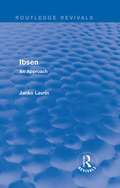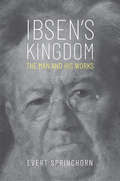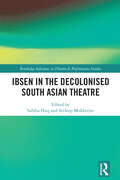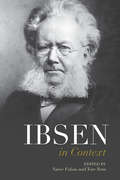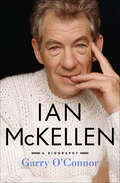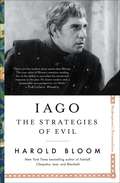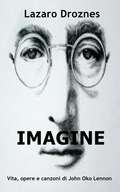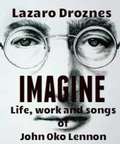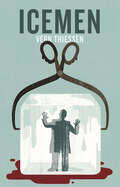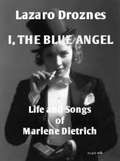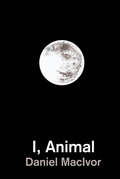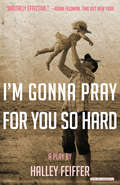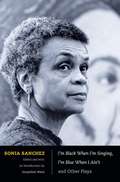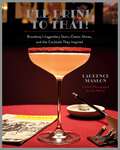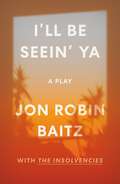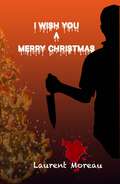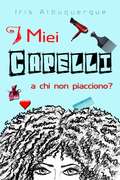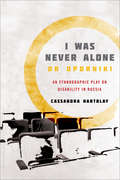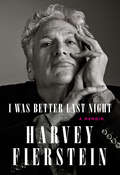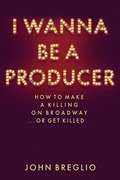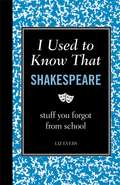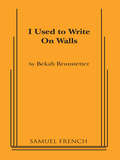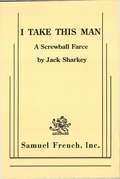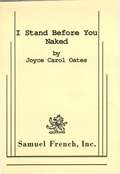- Table View
- List View
Ibsen: An Approach (Routledge Revivals #No. 18)
by Janko LavrinThis book, first published in 1950, could best be described as a combination of literary, psychological and social criticism. Considerable space is allotted to the personal inner drama of Ibsen, which provides not only a clue to his art but shows how most of his themes inevitably grew out of the other. The author also explores some of those factors which make Ibsen of interest to the generation that were facing the social and spiritual havoc of the post-war period. This book will be of interest to students of literature and theatre.
Ibsen's Kingdom: The Man and His Works
by Evert SprinchornA major biography of one of the most important figures in modern drama, evoked through a biographical reading of his plays Norwegian playwright Henrik Ibsen achieved unparalleled success in his lifetime and remains one of the most important figures in modern drama. The culmination of a lifetime of scholarship, Evert Sprinchorn&’s biography constructs Ibsen&’s life through a biographical reading of his plays with provocative and insightful analyses of his works, placing them and their author within the social, political, and intellectual foment of nineteenth-century Europe. This thought-provoking book will captivate anyone interested in the history of drama and the foundations of modernism.
Ibsen in the Decolonised South Asian Theatre (Routledge Advances in Theatre & Performance Studies)
by Sabiha Huq Srideep MukherjeeThis book maps South Asian theatre productions that have contextualised Ibsen’s plays to underscore the emergent challenges of postcolonial nation formation. The concerns addressed in this collection include politico-cultural engagements with human rights, economic and environmental issues, and globalisation, all of which have evolved through colonial times and thereafter. This book contemplates why and how these Ibsen texts were repeatedly adapted for the stage and consequently reflects upon the political intent of this appropriative journey of the foreign playwright. This book tracks the unmapped agency that South Asian theatre has acquired through aesthetic appropriation of Ibsen and thereby contributes to his global reception. This collection will be of great interest to students and scholars of theatre and performance studies.
Ibsen in Context (Literature in Context)
by Narve Fulsås Tore RemHenrik Ibsen, the 'Father of Modern Drama', came from a seemingly inauspicious background. What are the key contexts for understanding his appearance on the world stage? This collection provides thirty contributions from leading scholars in theatre studies, literary studies, book history, philosophy, music, and history, offering a rich interdisciplinary understanding of Ibsen's work, with chapters ranging across cultural and aesthetic contexts including feminism, scientific discovery, genre, publishing, music, and the visual arts. The book ends by charting Ibsen's ongoing globalization and gives valuable overviews of major trends within Ibsen studies. Accessibly written, while drawing on the most recent scholarship, Ibsen in Context provides unique access to Ibsen the man, his works, and their afterlives across the world.
Ian McKellen: A Biography
by Garry O'ConnorThe definitive biography of Sir Ian McKellen from an acclaimed biographer In 2001, Ian McKellen put on the robe and pointed hat of a wizard named Gandalf and won a place in the hearts of Tolkien fans worldwide. Though his role in the film adaptation of Lord of the Rings introduced him to a new audience, McKellen had a thriving career a lifetime before his visit to Middle Earth. He made his West End acting debut in 1964 in James Saunders’s A Scent of Flowers, but it was in 1980 that he took Broadway by storm when he played Antonio Salieri in Peter Shaffer’s Tony-Award-winning play Amadeus.He has starred in over four hundred plays and films and he is that rare character: a celebrity whose distinguished political and social service has transcended his international fame to reach beyond the stage and screen. The breadth of his career—professional, personal and political—has been truly staggering: Macbeth (opposite Judi Dench), Iago, King Lear, Chekhov’s Sorin in The Seagull and Becket’s tramp Estragon (opposite Patrick Stewart) in Waiting for Godot. Add to all this his tireless political activism in the cause of gay equality and you have a veritable phenomenon. Garry O’Connor’s Ian McKellen: A Biography probes the heart of the actor, recreating his greatest stage roles and exploring his personal life. Ian McKellen will show readers what makes a great actor tick. His life story has been a constantly developing drama and this biography is the next chapter.
Iago: The Strategies of Evil (Shakespeare's Personalities #4)
by Harold BloomFrom one of the greatest Shakespeare scholars of our time, Harold Bloom presents Othello&’s Iago, perhaps the Bard&’s most compelling villain—the fourth in a series of five short books about the great playwright&’s most significant personalities.Few antagonists in all of literature have displayed the ruthless cunning and deceit of Iago. Denied the promotion he believes he deserves, Iago takes vengeance on Othello and destroys him. One of William Shakespeare&’s most provocative and culturally relevant plays, Othello is widely studied for its complex and enduring themes of race and racism, love, trust, betrayal, and repentance. It remains widely performed across professional and community theatre alike and has been the source for many film and literary adaptations. Now award-winning writer and beloved professor Harold Bloom investigates Iago&’s motives and unthinkable actions with razor-sharp insight, agility, and compassion. Why and how does Iago use lies and deception—the fake news of the 15th century—to destroy Othello and several other characters in his path? What can Othello tell us about racism? Bloom is mesmerizing in the classroom, treating Shakespeare&’s characters like people he has known all his life. He delivers exhilarating intimacy and clarity in these pages, writing about his shifting understanding—over the course of his own lifetime—of this endlessly compelling figure, so that Iago also becomes an extraordinarily moving argument for literature as a path to and a measure of our humanity. &“There are few readers more astute than Bloom&” (Publishers Weekly), and his Iago is a provocative study for our time.
IMAGINE: Vita, opere e canzoni di John Ono Lennon
by Lázaro Droznes Maria Elena VaiasusoMusicista, cantante, compositore, fondatore dei Beatles e Cavaliere dell'Ordine Britannico, John Lennon è una delle icone più importanti della musica e della cultura del XX secolo. Il suo rifiuto dei valori prestabiliti e la sua capacità di innovazione, tanto a livello personale quanto artistico, sono fonte di ispirazione per qualsiasi generazione alla ricerca di un modello di vita che rompa gli schemi imposti e che aspiri alla creazione di un futuro migliore. In quest'opera Lennon ci confida storie e vicende personali, arricchendo il racconto con alcune delle sue canzoni, eloquenti almeno quanto gli stessi aneddoti.
IMAGINE
by Lázaro Droznes Moisés Moreno CostillaJohn Lennon was a musician, singer, songwriter, member of The Beatles, and Knight of the British Empire. He also is one of the maximum music icons of the 20th century. His rejection to the established values and his innovative capability in the musical and personal level are a source of inspiration to every generation that finds within his life a role model in the search of the rupture of the old patterns and in the construction of a new future. In this book John tells stories and situations of his life along with songs written by him which describe his life even better than his stories.
ICEMEN
by Vern ThiessenA wealthy businessman wakes up bound and gagged in a utility shed, kidnapped by his own employees—brothers and icemen Joe and Rennie. In the midst of the Great Depression, the brothers’ ice harvesting livelihood in Kempenfelt Bay is melting away due to the advent of refrigeration, only to further line the pockets of their employers. Desperate to claim what is rightfully theirs, these honest workers turned reluctant captors will stop at nothing to bring their greedy boss to a final reckoning. ICEMEN by Governor General’s Literary Award–winning playwright Vern Thiessen is an edge-of-your-seat thriller that exposes the human cost of capitalism and asks, when the wealthy exploit the working class, who are the real criminals?
I, the Blue Angel
by Lázaro Droznes Pablo BarrantesLife and Songs of Marlene Dietrich Marlene Dietrich was one of Hollywood's topmost stars and one of the greatest myths in cinema. She was born in Germany but later on, after being discovered by Josef von Sternberg, she migrated to the US to eventually become a citizen. She was the seduction icon, the fatal woman with the eternal femininity. Her intense militancy against Nazism and her participation, as a soldier in the Second World War revealed an extraordinary aspect of her life and personality. In this play, Marlene tells anecdotes, and speaks about intimate experiences of her legendary life interweaved with the famous songs that illustrated it. What is the mystery that Marlene hides and then reveals?
I, Animal
by Daniel Macivor"Man in Scrubs" follows the story of a queer black nurse who is getting awfully tired of being put in a box. He's queer, not gay, and he'll tell you the difference. He's always been an outcast, and constantly finds himself at the bottom of any and every hierarchy. With his patience waning, he confronts what it means to be an outsider, and, more importantly, what it means to take charge of one's own identity. "Boy in Hoodie" is the story of the "Dead Cat Kid," as he’s known by his classmates. He's fascinated by death—curious about it in a philosophical sense—but he's not morbid, and he didn't kill a cat. But which is more important, the truth or perception? "Woman in Prada" centres on an attractive, middle-aged woman who enjoys the finer things in life. And now that she's no longer a suburban housewife, she's finally free to explore her own desires. But what if they are leading her to be with a much younger man? Can she choose to put social optics to the side and do what makes her happy for once?
I'm Gonna Pray for You So Hard: A Play
by Halley Feiffer“Feiffer’s is a unique, refreshing voice to which attention should be paid.” —TheaterMania Ella is a precocious and fiercely competitive actress whose aims in life are making her famous playwright father proud—and becoming famous herself. In the aftermath of a boozy, drug-fueled evening when Ella’s father is particularly hurtful, she flings herself into the arms of a young director with whom she begins to collaborate on a one-woman show . . . about her father. Halley Feiffer’s dark, probing, and much-anticipated new play is a fierce, funny, and gloves-off take on the eternal struggles of parents and children to find common ground.
I'm Black When I'm Singing, I'm Blue When I Ain't: And Other Plays
by Sonia SanchezSonia Sanchez is a prolific, award-winning poet and one of the most prominent writers in the Black Arts movement. This collection brings her plays together in one volume for the first time. Like her poetry, Sanchez's plays voice her critique of the racism and sexism that she encountered as a young female writer in the black militant community in the late 1960s and early 1970s, her ongoing concern with the well-being of the black community, and her commitment to social justice. In addition to The Bronx Is Next (1968), Sister Son/ji (1969), Dirty Hearts (1971), Malcolm/Man Don't Live Here No Mo (1972), and Uh, Uh; But How Do It Free Us? (1974), this collection includes the never-before-published dramas I'm Black When I'm Singing, I'm Blue When I Ain't (1982) and 2 X 2 (2009), as well as three essays in which Sanchez reflects on her art and activism. Jacqueline Wood's introduction illuminates Sanchez's stagecraft in relation to her poetry and advocacy for social change, and the feminist dramatic voice in black revolutionary art.
I'll Drink to That!: Broadway's Legendary Stars, Classic Shows, and the Cocktails They Inspired
by Laurence MaslonBroadway has always raised a glass to celebrate itself—what&’s an opening night without popping the cork of a bottle of Champagne? I&’ll Drink to That! Broadway&’s Legendary Stars, Classic Shows, and the Cocktails They Inspired is a celebration of theatrical tradition, a souvenir of magic moments on stage, and a practical guide to concocting one-of-a-kind craft cocktail recipes inspired by the classics of the American stage. I&’ll Drink to That! expertly mixes clever cocktails that pay homage to unforgettable Broadway shows--such as the Rainbow High from Evita and the Sidecar Named Desire--with authentic recipes for drinks that played supporting roles in beloved shows--like the legendary Vodka Stinger from Company--and shakes it up with a history of the cocktail on Broadway, detailed by one of the leading musical theater historians, Laurence Maslon. Featured throughout are fantastic images—from intoxicating images of classic shows to portraits of effervescent stage celebrities to vintage liquor ads featuring Broadway stars. Of course, the drinks themselves get their own spotlight, photographed by the legendary Broadway photographer Joan Marcus at the iconic Sardi&’s restaurant, home to hundreds of opening nights over the past century. With drinks ranging from the South Pacific-inspired Bali Ha&’i Ma&’i Ta&’i to Mame&’s Cornhusker mint julep to the Hamilton My Shot, and illustrated with a wide range of rare drawings, posters, and advertisements,, I'll Drink to That! is the perfect gift for anyone who loves the theater, enjoys an elegant bend of the elbow, and wants to be part of a long and bubbly theatrical history. 30 DRINK RECIPES: Dozens of delicious drink recipes from pre-theater cocktails to cozy after-theater toddies to celebratory toasts guaranteed to earn a standing ovation! COCKTAILS WITH A TWIST: Clever takes on Broadways shows and show tunes, including the Toast of Mayfair (Cabaret), the Bloody Sweeney (Sweeney Todd), and the Dead Thing (Beetlejuice). STARS OF THE SHOW: Classic recipes for drinks that feature center stage in famous plays and musicals, such as the Vodka Stinger from Company and the Sazerac from State of the Union. BROADWAY&’S BUBBLY HISTORY: Dive deep into dozens of stories and anecdotes about how cocktails and drinking played a role in creating some of Broadway&’s greatest hits. PHOTOS BY A LEGEND IN A LEGENDARY PLACE: Drinks photographed by the legendary Broadway photographer Joan Marcus in Broadway&’s most famous theater restaurant, Sardi&’s.
I'll Be Seein' Ya: with The Insolvencies
by Jon Robin BaitzTwo searing, incisive plays from Jon Robin Baitz, Tony Award nominee and two-time Pulitzer Prize finalist. Allie Murchow, a retired Hollywood makeup artist, is stuck inside her apartment, stuck in her daydreams of bygone celebrity and glamour, and stuck on hold with her pharmacist. She tries to make sense of the Los Angeles outside her windows, the LA of 2020, but she can’t hear herself think over the echo of sirens and her chatty brother’s interjections. I’ll Be Seein’ Ya, written by Jon Robin Baitz, the author of Other Desert Cities and Vicuña, is an unflinchingly funny new play that takes on our anxieties and delusions and reveals new truths about our strange reality.In The Insolvencies, two men—one younger, one older, one a professor, one a former student—recall their relationship and the time they felt “the piercing sting of simply being seen.” A study of sex and pleasure, of justice and shame, this short, stirring play completes the affecting pair of new works from Baitz, “the American theatre’s most fascinating playwright of conscience” (Michael Kuchwara, Associated Press).
I wish you a Merry Christmas
by Laurent MoreauAt school, a clan seems great. What to say when you choose someone whom seems weaker than others and it goes wrong? A destroyed life, a malaise... a revenge! They say revenge is a dish best served cold! well, that's just an understatement.
I miei capelli, a chi non piacciono?
by Iris Albuquerque Martina MorbidiniE a história de Laura, uma ragazza nera, raccontata atrapalhou uma pagina do suo diario. Il libro si concentra sulla sugli episodi traumatici e di discriminazione che marcano la sua vita partire prime esperienze a scuola. Busca livre é uma história de Julio e de Rita, amici inseparabili di Laura. Con ti malinconi ma in episodi spesso divertenti, Laura ci confessa le sue paure, i suoi sogni ei suoi problemi. Momenti marcanti della sua infanzia, adolescenza e della prima fase dell'età adulta. Laura ricerca nuove forme per affareare fatti senza dover rinunciare al suo passato, ma per vivere serena e senza portarsi dietro troppi traumi. E tra lacrime e risate, episodi romantici si avvicendano nella sua storia, rendendo la lettura appassionante e avvolgente. Não é ribellione, è libertà!
I Was Never Alone, or Oporniki: An Ethnographic Play on Disability in Russia (Teaching Culture: UTP Ethnographies for the Classroom)
by Cassandra HartblayI Was Never Alone or Oporniki presents an original ethnographic stage play, based on fieldwork conducted in Russia with adults with disabilities. The core of the work is the script of the play itself, which is accompanied by a description of the script development process, from the research in the field to rehearsals for public performances. In a supporting essay, the author argues that both ethnography and theatre can be understood as designs for being together in unusual ways, and that both practices can be deepened by recognizing the vibrant social impact of interdependency animated by vulnerability, as identified by disability theorists and activists.
I Was Better Last Night: A Memoir
by Harvey FiersteinA poignant and hilarious memoir from the cultural icon, gay rights activist, and four-time Tony Award–winning actor and playwright, revealing never-before-told stories of his personal struggles and conflict, of sex and romance, and of his fabled careerHarvey Fierstein&’s legendary career has transported him from community theater in Brooklyn, to the lights of Broadway, to the absurd excesses of Hollywood and back. He&’s received accolades and awards for acting in and/or writing an incredible string of hit plays, films, and TV shows: Hairspray, Fiddler on the Roof, Mrs. Doubtfire, Independence Day, Cheers, La Cage Aux Folles, Torch Song Trilogy, Newsies, and Kinky Boots. While he has never shied away from the spotlight, Mr. Fierstein says that even those closest to him have never heard most of the tales—of personal struggles and conflict, of sex and romance, of his fabled career—revealed in these wildly entertaining pages. I Was Better Last Night bares the inner life of this eccentric nonconforming child from his roots in 1952 Brooklyn, to the experimental worlds of Andy Warhol and the Theatre of the Ridiculous, to the gay rights movements of the seventies and the tumultuous AIDS crisis of the eighties, through decades of addiction, despair, and ultimate triumph. Mr. Fierstein&’s candid recollections provide a rich window into downtown New York City life, gay culture, and the evolution of theater (of which he has been a defining figure), as well as a moving account of his family&’s journey of acceptance. I Was Better Last Night is filled with wisdom gained, mistakes made, and stories that come together to describe an astonishingly colorful and meaningful life. Lucky for us all, his unique and recognizable voice is as engaging, outrageously funny, and vulnerable on the page.
I Wanna Be A Producer: How to Make a Killing on Broadway... Or Get Killed
by John BreglioWhat does a "producer" actually do? How does one travel from that great idea for a show to a smash hit opening night on Broadway? John Breglio cannot guarantee you a hit, but he does take the reader on a fascinating journey behind-the-scenes to where he himself once stood as a child, dreaming about the theatre. Part memoir, part handbook, I Wanna Be a Producer is a road map to the hows and wherefores, the dos and don'ts of producing a Broadway play, written by a Broadway veteran with more than 40 years of experience. This comprehensive and highly informative book features practical analysis and concepts for the producer and is filled with entertaining anecdotes from Breglio's illustrious career as a leading theatrical lawyer and producer. Breglio recounts not only his first-hand knowledge of the crucial legal and business issues faced by a producer, but also his experiences behind the scenes with literally hundreds of producers, playwrights, composers, and directors, including such theatre luminaries as Michael Bennett, Joe Papp, Stephen Sondheim, Andrew Lloyd Webber, Patti Lupone, August Wilson, and Mel Brooks. Whether you are a working or aspiring producer, an investor, or are just curious about the backstage reality of the theater, Breglio shares his knowledge and experience of the industry, conveying practical information set against the real-life stories of those who have devoted their lives to the craft.
I Used to Know That: Shakespeare
by Liz EversCapturing the unbelievable scope of Shakespeare's influence, this book covers the little-known details of Shakespeare's life along with the surprising legacy of the language and phrases inherited from his works. Organized for easy reference, sections include: Shakespeare's Life Who was this man--the playwright, the lover, the family man? Words and Phrases Owed to Shakespeare Did you know we have Shakespeare to thank for words such as "bandit," "fashionable," and "moonbeam" and the phrases "in my mind's eye," "in my heart of hearts," and "to thine own self be true"? His Theater and Plays Synopses of the most famous of his plays Character Glossary All the most memorable, infamous, and beloved characters from Shakespeare's collective works, including Beatrice, Julius Caesar, Ariel, Falstaff, Cleopatra, Othello, and Horatio Index of Famous Lines "Better a witty fool than a foolish wit" from Twelfth Night and "Tempt not a desperate man" from Romeo and Juliet Whether you're planning an appearance on Jeopardy or simply want to become a more interesting conversationalist, I Used to Know That: Shakespeare will provide you with hours of entertainment.
I Used To Write On Walls
by Bekah BrunstetterDrama \ 1m, 6f \ Unit Set \ Diane, Georgia and Joanne are 3 modern women living very different lives. Unbeknownst to them, they are all pining after the same young man, Trevor: sexy, stoned, oblivious; a surfer on a rad, rad philosophical journey. When a beautiful 11 year old girl named Anna, and Mona (a sexy, widowed astronaut) are thrown into the crosswinds of diverse romantic affairs, hearts will be broken, loves will be lost, and youthful cries of hope, anger, and sadness will be written on walls. Mothers will try to guide their daughters from the promise and beauty of youth through the diminishing opportunities of aging. Daughters will go to the extremes of passion to hold on to their fantasies of love. One man will be in the middle of a romantic storm of graffiti, drugs, sexual asphyxiation, gunshots, explosions, and desire.
I Take This Man
by Jack SharkeyFarce / 3m, 2f / Interior / When lovely young Gideon Hollis a.k.a. Giddy spots an unconscious man in a tank top and shorts lying in Copley Square just after all other Boston Marathon racers have crossed the finish line, she reasons that since nice guys finish last, this must be Mr. Right! She has a helpful policeman tote him to her nearby apartment, shocking her roommate whose fiance is due for a dinner date. When the comatose dreamboat revives and cannot remember who he is, Giddy tells him they are married and regrets her subterfuge when he tries to be a loving husband. Complications escalate at a furious pace in this outrageous concoction of wild, warm, and lightning paced hilarity that is perfect for the entire family.
I Stand Before You Naked
by Joyce Carol OatesMonologues / 11f / Bare Stage / This extraordinary collection of dramatic monologues by one of America's foremost women of letters rivals Talking With in dramatic intensity, language and sheer weirdness. The evening begins and ends with the title poem, a haunting evocation of woman on the edge of madness and vulnerability. Also included are Little Blood Button; Wife of; Wealthy Lady; The Boy; The Orange; Good Morning, Good Afternoon; Darling, I'm Telling You (Angel Eyes); Nuclear Holocaust; Slow Motion and Pregnant. There is humor here, but mostly the monologues are gripping portraits of the pathetic, the strange, and the horrifying.
I Never Knew What Time It Was
by David AntinAntin explores the experience of time--how it's felt, remembered, and recounted. These free-form talk pieces--sometimes called talk poems or simply talks--began as improvisations at museums, universities, and poetry centers where Antin was invited to come and think out loud.
